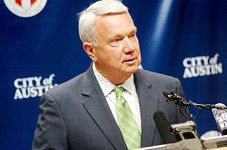Point Austin: Bad Advice
A few questions about the city's designated experts
By Michael King, Fri., June 11, 2010

If only it were that easy.
While I had no great affection for Smith or his legal department, I'll resist the urge to kick him now that he's gone – that job has already been claimed by local "activists" calling for his pension and his public humiliation. In any case, my pinch hitter, City Hall Hustler Wells Dunbar, did a thorough job in this space a couple of weeks ago reviewing the public litany of some of Smith's highly dubious legal counsel, which culminated in his bizarre conclusion that the KeyPoint report on the Sanders shooting must be withheld not only from the public, but from the City Council that commissioned it. City Manager Marc Ott is reportedly still in the midst of trying to explain to Mayor Lee Leffingwell just how that patently absurd decision came to be made, and we can all look forward eagerly to how that turns out.
Nor have we heard the end of the Sanders shooting, the subject of a federal lawsuit by Sanders' family that will undoubtedly reveal even more about the city's bureaucratic procedures, although it will do nothing to undo the series of bad decisions – on all sides – that led to Sanders' death.
Telescopic Hindsight
Among the stranger revelations last month was the release of yet another copy of the KeyPoint report, this one belonging to Austin Police Chief Art Acevedo, who had sent it for review to Lt. Paul Golonski, a former colleague in the California Highway Patrol. The exchange appeared to make even more hash of the city's claims that it was illegal for outsiders to see the report, and Jim Harrington of the Texas Civil Rights Project has charged that Acevedo broke state law – although Harrington had also sued to get the report released, so the mutual finger-pointing on the transparency issue is getting fairly confusing.
Because of the pending litigation, Acevedo is now referring all inquiries about the matter to his boss, Assistant City Manager Michael McDonald, and McDonald's position is that the chief of police has the right to get advice wherever he needs it, especially from other law enforcement colleagues. "All investigations are under the auspices of the police chief, and so he has the right to inquire of other departments, other professionals," McDonald told me. "Even when I was an assistant chief, I would call other departments and ask them how they handled certain issues. So he has the right to go outside the department, particularly to another law enforcement entity, and get feedback."
I'll let the lawyers work out that one – when it comes to reading official reports, I say the more the merrier. What puzzles me more, and hasn't yet been the subject of much discussion, is the actual substance of Golonski's handwritten notes on Acevedo's KeyPoint copy, which on its face Golonski denounces as "The Hubble Telescope of 20-20 Hindsight."
That's one of his milder remarks – he calls several recommendations "B.S." and "lunacy" and refers to the consultants as "lazy basterds," among other things. It's also difficult to know what any investigation review – including Golonski's own – might offer other than hindsight. In his notes throughout, Golonski takes great pains to reimagine the shooting incident at the Walnut Creek apartments on Springdale as taking place in a deeply gang-infested context of imminent violent danger to the police officers – thereby turning the focus away from the shooting of Sanders to some potential attack on the police that in fact never occurred. That enables him to dismiss every conclusion of the report as so much armchair second-guessing and "boiler plate," as he reduces the entire causation to the single moment that Officer Leonard Quintana saw Sanders reach for a gun – thereby justifying the shooting.
Golonski's notes are dotted with references to "gangsters" and "home boys" and "bangers" that imagine a mob scene that was never even alleged. At his most hyperbolic, Golonski describes Walnut Creek as "Austin's version of Nickerson Gardens" – referring to a massive Los Angeles housing project notorious for gang warfare and assaults on police. It's a comparison so over-the-top and inaccurate that it's difficult to credit anything else Golonski says – he's seeing East Austin through the lens of Watts and imagining a virtual war zone. Indeed, if the comparison were remotely accurate, Quintana and his colleagues would have been even more foolhardy and "reckless" – to use the judgment applied by KeyPoint – in their thoughtlessly casual approach to the incident that ended in Sanders' death.
No Credibility
It's not clear what weight Acevedo assigned to Golonski's notes, although his eventual exoneration of Quintana on the shooting suggests he agreed at least with Golonski's "split-second" analysis of Quintana's decision to shoot. (In fairness, Acevedo also disagreed with KeyPoint's "inconclusive" finding in the 2007 police shooting of Kevin Brown, instead firing Officer Michael Olsen for failures in tactics and judgment.) Presumably, Acevedo may eventually get a chance to explain his Quintana decision in federal court.
McDonald says he doesn't know what influence Golonski's notes had on Acevedo's decision and hasn't asked him. McDonald said that when he himself reviewed Golonski's report, he found it "inappropriate and unprofessional, and I gave it no credibility."
"As I said before," McDonald told me, "certainly when we get feedback we expect it to be professional in nature, and something that we can use. So we do not support the comments and the manner in which that feedback came." One thing is certainly clear: In the ongoing official revelations concerning the Sanders episode, David Smith was far from the only source of really bad advice.
Got something to say on the subject? Send a letter to the editor.










